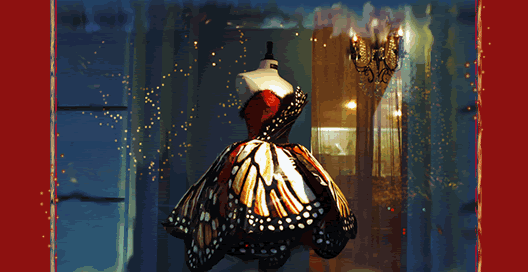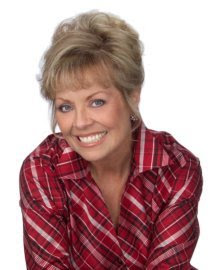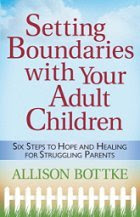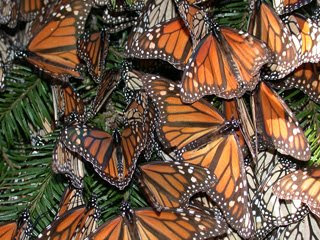This past weekend, on our way back home from Wisconsin, hubby and I bought a stack of vintage Radio Guide issues. This is the story of just one article...
Happy Madmen, by Lorraine Thomas is the "sensitive" 1938 "educational" piece published in the weekending October 15, 1938 issue of Radio Guide on the how the "modern miracle" of radio is working wonders for America's 400,000 mentally ill.
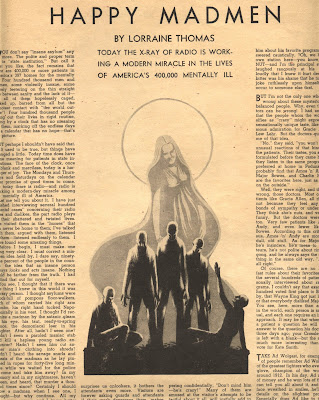
It begins:
You don't say "insane asylum" any more. The polite and proper term is "state institution." But call it what you like, the fact remains that there are 400,000 or more patients in America's 397 homes for the mentally ill.So first Lorraine tells us what's polite and proper -- then, with, "call it what you like," she dismisses any need to do so.
Four hundred thousand men and women, some violently insane, some merely teetering on the thin straight line between sanity and the lack of it -- but all of them hopelessly caged, locked up, barred from all but the remotest contact with "the world outside"! Four hundred thousand people living out their lives in rigid routine, living by a clock that has no meaning for them, marking off the endless days on a calendar that has no hope -- that's the picture.(Wow. There's some compassion!)
But perhaps I shouldn't have said that. It used to be true, but things have changed a little.Yup, because of radio.
:Pause:
One wonders if "a little" change means anything to people so hopeless, to people who find no meaning in clocks...
But the article asserts radio does wonders.
Lorraine does not.
She tosses out phrases like "mysteriously unbalanced people," and expresses such contempt I, at least, have to wonder if she is capable of any compassion at all. But then maybe that's why she was sent to survey the (as she says) self-described nuts on their radio program favorites. Perhaps cold and removed helps one facilitate surveys. Or maybe I'm to believe that the "several hundred patients" she interviewed drove her to her demeanor.
Some notable quotes:
"Most of the patients like Gracie Allen, all right -- but not because they feel any strange bonds of sympathy or understanding. They think she's nuts, and very, very funny."
"Very few patients like Amos 'n' Andy, and even fewer like Major Bowes. According to this critical census, Amos 'n' Andy are monotonous, dull, old stuff. As for Major Bowes, he's insincere, he's mean to the amateurs, he's not polite about ringing the gong, and he always says the same old thing in the same old way. 'All right, all right.'"
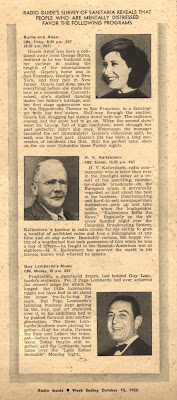
Radio Guide's Survey Of Sanitaria Reveals That People Who Are Mentally Distressed Favor The Following Programs:
Burns and Allen (CBS), H.V. Kaltenborn (CBS), and Guy Lombardo's Music (CBS).
I guess we know what the "C" in CBS is for.
While this article is supposed to extol the virtues of radio programming for the mentally ill, some of the stories seem more than a bit misplaced. Even crazily so.
While the story of Mrs. Diggs has its, "Oh, aren't the crazy charming!" value, it leads to a different place...
Take a look at Mrs. Diggs. Mrs. Diggs is a Negro, a man, who considers himself the most beautiful white woman in the world. He says he has letters from President Roosevelt, Will Hayes, Lindbergh and Joe Louis telling him so. What's more, he's the mother of all the white people in the world. "Mrs. Diggs" has other delusions too. At times he thinks he's Henry Ford, Rockefeller, and Edison rolled into one. He always insists he's the richest person in the world. About radio he was at first a bit dubious, until I pointed to a receiving set. Then he smiled knowingly, and acknowledged, "Oh, yes, the radio. I invented it."I think the real tragedy is Lorraine's article.
You mightn't think such a delusion could be very dangerous, but that's where you are wrong. One can never tell about such things. There's another patient in this same hospital who had an even more fantastic delusion. This patient knew a lot more abut the radio than the case just quoted. This man was a radio fan. He wrote letters applying for a job to all the Hollywood radio stations, and once he even won an amateur contest. One morning, while listening to KHJ, he heard one of the popular songs of that period, "There's a Ring Around the Moon." To most of us, that song is no more important than any other -- but to Mr. Radiofan "There's a Ring Around the Moon" carried a very special and important message. Mr. Radiofan considered himself uniquely gifted person, and one of his secret talents was putting rings around the moon. Therefore KHJ's broadcast of the song could mean only one thing: they were sending out an SOS to him -- KHJ needed him to come down and teach them how to put a ring around the moon. Mr. Radiofan lost no time. He ran up a $27 taxi-bill going from Santa Ana to Los Angeles. Asking the taxi-driver to wait, he went into the studio. Soon talking with the secretary of the man in charge of employment, he asked for his job -- the job that was waiting for him. Impatient at the questions he was asked, he suddenly took out a knife, opened it, raised his arm and stared menacingly at the terror-stricken girl. She screamed, an announcer ran into the room -- and was stabbed in the throat. Before the maniac was finally overpowered, another bystander's scalp and clothing were in bloody shreds, and the announcer had bled to death. The real tragedy in this story is that the boy's death was so unnecessary: Mr. Radiofan was a paroled patient from a midwestern institution.
PS Searches returned nothing on such a murder at KHJ; but I did find this 1931 KHJ aircheck of Bing Crosby.
